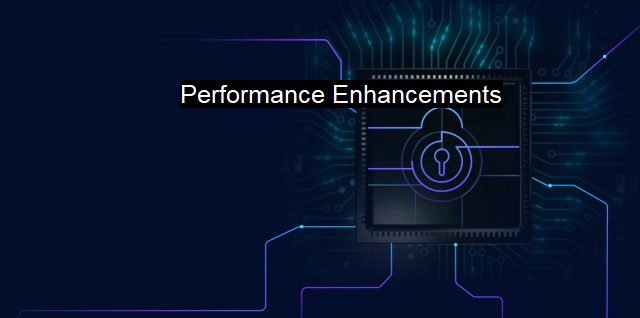What are Performance Enhancements?
Achieving Optimal Cybersecurity: The Importance of Performance Enhancements in Antivirus Software
Performance Enhancement in the context of cybersecurity and antivirus refers to the techniques and tools used to optimize the performance and efficiency of security software. It is about enhancing the ability of cybersecurity and antivirus software to protect digital systems, networks, and devices from potential threats with reduced resource consumption and increased speed.Cybersecurity and antivirus software are crucial in today's digital environment as they guard against ever-increasing sophisticated attacks such as malware, viruses, ransomware, phishing, and other malicious activities initiated by cybercriminals. Although quite significant in dealing with cyber threats, security programs sometimes consume considerable system resources, thereby lowering system performance. This sets the stage for performance enhancements.
When we speak of performance enhancements, we refer to strategies or adjustments aimed at reducing the load on system resources, such as processor speed, memory capacity, disk space, and overall system performance, to ensure an efficient cyber defence without hindering productivity. Performance enhancements mainly focused on two areas - speed and system resources.
Speed enhancement aims to ensure that cybersecurity software performs its checking, scanning, and blocking operations entirely without substantial time lag. The time in which an antivirus detects, scans, and removes a threat can significantly affect a system, notably when dealing with highly aggressive malware or viruses. A slight delay might be enough for the virus to infect the system, leading to data loss or damaged systems.
Enhancing software capabilities to ensure rapid updates, instant scans, real-time protections, and quick remedial actions qualifies as critical elements of speed enhancements. Most antivirus software nowadays is cloud-based, enabling quicker responses to new threats without having to allocate their specific device's resources. Deep learning AI employed by several next-gen antivirus also ensures reduced-delay reactions to diverse threats.
System resource efficiency, on the other hand, is about optimizing security software to consume fewer system resources. Some security software uses a substantial volume of resources, potentially slowing down their host or blocking other operations. There are even instances where anti-virus turns into bloatware, causing more harm than good. Streamlining the use of systems resources entails optimizing memory proficiencies, reducing disk usage, and handling processor speed to minimize lag in device performance.
Multi-scanning technologies allow for simultaneous threat detection using various security platforms without any significant systems resource consumption, enhancing system performance while ensuring robust protection.
The continuing advancement in artificial intelligence and machine learning is also revolutionizing performance enhancements. Intelligent, self-learning systems capable of identifying and dealing with countless threats are increasing while making more accurate inferences about potential risks without an extensive manual scan.
Improving software design, timely patch updates, or architectural changes in hardware could potentially help cyber-security get effective against attacks while remaining gentle on system resources.
Performance enhancement is about balancing and optimizing security and efficiency. Enhancing cybersecurity or antivirus software to ensure security in the digital space, while being robust and lightweight on system resources is essential. Performance enhancements not only ensure a safer cyberspace but also improved overall system performance, leading to increased productivity and smooth user experience. Despite the formidable challenge of comprehending cybersecurity dynamics, harnessing technology and innovations is key in navigating towards achieving the optimal performance enhancement in cybersecurity and antivirus systems.

Performance Enhancements FAQs
What are performance enhancements?
Performance enhancements refer to any improvements in the speed, efficiency and overall productivity of a system. In the context of cybersecurity and antivirus, performance enhancements can include optimizing processes and using specialized algorithms to detect and mitigate threats more quickly and effectively.Why are performance enhancements important for antivirus software?
Performance enhancements are crucial for antivirus software as they can significantly reduce the time it takes to detect and remediate threats. In a world where cyber threats are becoming more sophisticated and frequent, performance enhancements can mean the difference between being protected and being exposed to a potential breach or attack.What are some common performance enhancements used in cybersecurity?
Common performance enhancements used in cybersecurity include virtualization, hardware acceleration, machine learning and artificial intelligence. These technologies can speed up the processing of large amounts of data, improve the accuracy and effectiveness of threat detection, and reduce false positives.Can performance enhancements slow down my computer?
Performance enhancements are designed to increase the speed and efficiency of systems, so in most cases, they should not slow down your computer. However, some performance enhancements may require additional system resources, such as memory or processing power, which could potentially impact system performance. It is important to work with reputable cybersecurity vendors who have experience in optimizing system performance while still providing robust protection against threats.| | A | | | B | | | C | | | D | | | E | | | F | | | G | | | H | | | I | | | J | | | K | | | L | | | M | |
| | N | | | O | | | P | | | Q | | | R | | | S | | | T | | | U | | | V | | | W | | | X | | | Y | | | Z | |
| | 1 | | | 2 | | | 3 | | | 4 | | | 7 | | | 8 | | |||||||